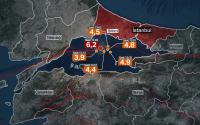The churn of a rapidly changing financial landscape left Wall Street cold on Monday, as a late afternoon sell-off sent the stock market to its worst daily loss in seven years.
The Dow Jones Industrial Average plummeted more than 500 points - its worst session since the days after the Sept. 11, 2001 terrorist attacks.
The blue-chip index spent the entire day in negative territory, but the losses did not begin approaching dramatic levels until late in the afternoon. In the last 30 minutes of trading, investors seemed to give in to their fears about the health of the financial system, igniting a wave of selling that sent the Dow, already about 300 points lower, to a 504.48 point decline for the day.
The Standard & Poor's 500-stock index fared even worse, losing 4.7 percent, and the technology-heavy Nasdaq composite index fell 3.2 percent. In Europe, benchmark stock indexes were off nearly 4 percent in London and Paris and almost 3 percent in Frankfurt.
In a briefing in Washington, the Treasury secretary, Henry M. Paulson Jr., said the financial markets were going through a tough time "as we work off some of the past excesses," but that Americans could "remain confident in the soundness and the resilience of our financial system."
"Let me step back a bit and provide a little perspective," Mr. Paulson said. "As I've long said, the housing correction is at the root of the challenges facing our markets and our financial institutions. I believe that we've taken very important steps with respect to Fannie Mae and Freddie Mac, and they're amongst the most important actions we can take to work through this turmoil."
The secretary said he was committed "to working with regulators here and abroad, as well as policy makers in Congress to take additional necessary steps" to stabilize the markets. But while emphasizing that the government was prepared to play an important role "because, as you've heard me say, nothing is more important right now than the stability of our capital markets," he declined to be very specific on what that role should be.
On Wall Street, Lehman shares fell 95 percent on Monday, to just over 21 cents a share. Another company at the center of the concerns, American International Group, saw its stock fall 61 percent, down to $4.76 a share, even as state officials in New York stepped in to provide financial assistance in the face of a potential downgrade from credit ratings agencies and the Federal Reserve asked two banks to develop a $70 billion loan package.
Gov. David A. Paterson said the state would allow A.I.G. to borrow $20 billion from its subsidiaries to bolster its capital as it faces potentially disastrous credit downgrades. Investors remain concerned that the company does have not have enough capital to withstand cuts to its debt rating.
A.I.G. approached the state for help, Mr. Paterson said, and state officials worked closely with the firm throughout the weekend. A.I.G. has sought a $40 billion bridge loan from the Federal Reserve as a lifeline, as the three-part rescue plan it had devised appeared to crumble, a person briefed on the matter said.
On Wall Street, as Lehman employees fretted about their fate and wondered how their firm will be broken apart, the chiefs of Bank of America and Merrill Lynch put on a positive face about their unexpected $50 billion deal.
In New York, Kenneth D. Lewis, chief executive of Bank of America, said that he did not want to risk losing the opportunity to buy Merrill, a name-brand wealth management giant. "Merrill had the liquidity and capacity to see this through," Mr. Lewis said.
Merrill's stock closed nearly flat, one of the only major financial firms that did not suffer steep losses. Shares of Bank of America were down 21 percent; Morgan Stanley lost 13.5 percent, and Goldman Sachs was off 12 percent.
Although Mr. Lewis said Monday that no decisions had been made about layoffs, thousands of people were expected to lose their jobs. One group that seemed relatively safe was Merrill's 17,000 financial advisers, which Mr. Lewis called "the crown jewel of the company." Bank of America may offer Merrill's brokers a bonus to stay after the merger, he said.But a white knight did not appear at Lehman Brothers over the weekend, and the investment bank began the task of trying to reorganize and sell assets under court protection.
Lehman's bankruptcy filing did not include the firm's broker-dealer operations and other units, like its asset management division Neuberger Berman. Those businesses will continue to do business, although Lehman is expected to liquidate them.
In its court petition, Lehman said that as of May 31, it had assets of $639 billion and debt of $613 billion. It listed Citigroup among its biggest unsecured creditors, with about $138 billion in bonds as of July 2. The Bank of New York Mellon Corporation was listed as holding about $17 billion in debt.
A Citi spokeswoman said: "This does not represent exposure for Citi to Lehman."
As the elements continued to unfold Monday, traders on Wall Street tried to adjust.
On the floor of the New York Stock Exchange, James Maguire, a managing director at Christopher J. Forbes, a trading firm, said that traders had been shaken by Lehman's collapse and Merrill's sudden sale.
"There's a lot of fear of the unknown," Mr. Maguire said. "There's a fear of more financial land mines."
Yields on Treasury notes plummeted as investors scrambled to hide their cash in ultra-safe government notes. The dollar also weakened against several foreign currencies.
In another surprise development, the price of crude oil dropped more than $7 a barrel in electronic trading, nearing the $94 mark, as investors appeared to bet that a global downturn would cause a sharp drop in demand for energy. Oil closed at $95.71, down $5.47, on the New York Mercantile Exchange.
Monday's sell-off, though widely predicted, came despite moves by central banks around the world to restore investor confidence by injecting enormous amounts of capital into the financial system. The European Central Bank distributed 30 billion euros to major banks; the Bank of England issued £5 billion, or about $9 billion, in loans.
The Federal Reserve said it would accept a broader array of collateral in exchange for large loans to securities firms. And a group of 10 banks that includes JPMorgan Chase, Goldman Sachs and Citigroup gathered a $70 billion fund to help ensure market liquidity.
The major stock markets in Japan, South Korea, Hong Kong and China were all closed for holidays on Monday, granting some reprieve to investors in those areas. But other Asian markets slid, with the benchmark Taiwan index down 4.1 percent and the BSE losing 3.6 percent in Mumbai.
Analysts interviewed on Monday morning stressed that the atmosphere stopped short of panic.
"Investors are wandering around in a daze," Stephen Lewis, head of research at Monument Securities in London, said. "It's not a panic by any means, but there is a sense that we'll see a few more weekends like the last two and then we're looking at a long, long convalescence."
Reporting was contributed by David Stout in Washington, Keith Bradsher in Hong Kong, Carter Dougherty in Paris, Matthew Saltmarsh in Paris, Andrew Ross Sorkin in New York and Julia Werdigier in London.






